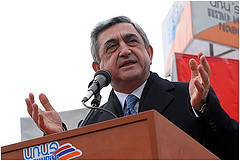Armenia, Turkey: Tense Half-Time
By Asbed Kotchikian for ISN
As domestic turmoil in Iran and Georgia rise, Armenia is bracing itself for the next round of foreign policy activism with Turkey.
The first municipal elections in the Armenian capital Yerevan on 31 May yielded the expected results when the ruling Republican Party of Armenia won over 47 percent of the votes, which along with its coalition ally Prosperous Armenia Party’s 23 percent, cemented President Serge Sargsyan’s hold on power. The elections came over a year after a hotly disputed presidential election, which gave the presidency to Sargsyan and was followed by the bloody suppression of mass demonstrations.
The timing and importance of the municipal elections was more relevant to the country’s foreign policy than it was to any domestic or municipal issue. Thus, in April, over a month before the municipal elections, Armenia and Turkey announced that the governments of both countries had come up with a roadmap to normalize the relations and to eventually address the reopening of their borders, and more importantly, to study the issue of Armenian demands that Turkey recognize as genocide the mass killings of the Armenian population under the Ottoman Empire in early 20th century.
When Sargsyan won the disputed presidential elections in February 2008, his position was very weak domestically, and as such he tried to score some political points on the foreign policy front by inviting Turkish President Abdullah Gul to visit Yerevan in September 2008 to attend a soccer match between Armenia and Turkey as part of the World Cup qualifying games. Gul’s visit and the subsequent increase in activities on the Armenian-Turkish talks led many analysts and circles critical of Sargsyan to dub this as “soccer diplomacy.”
The April announcement by the two governments received both heavy criticism and great praise. The criticism came mostly from the Armenian side, opposing Sargsyan, while the praise was spearheaded mostly by diplomatic circles in the US, which seems to have heavily invested in the process with the aim of increasing the political capital and prestige of US diplomacy by resolving one of the major hurdles of peace in the region.
While Sargsyan hoped that a diplomatic success with Turkey could translate to increased political legitimacy at home, the result has been quite the opposite: One of the more nationalist partners in the ruling coalition, the Armenian Revolutionary Federation, decided to leave the coalition. This could explain why the Yerevan municipal elections were a battleground to show political might as the capital city includes more than one-third of the country’s electoral might. In a reversal of order, Sargsyan seems to have utilized these elections to boost his legitimacy on the foreign policy scene.
With the second soccer match between Armenia and Turkey scheduled in October 2009 in Ankara, and because the Armenian president has a standing invitation to visit from the Turkish president, it seems that Sargsyan needs all the help he can get to increase his prestige as a politician in control in an otherwise an increasingly uncontrollable region.
Time is running out until the beginning of this second round, and unlike an actual game it seems that the intermission is the most eventful aspect.

